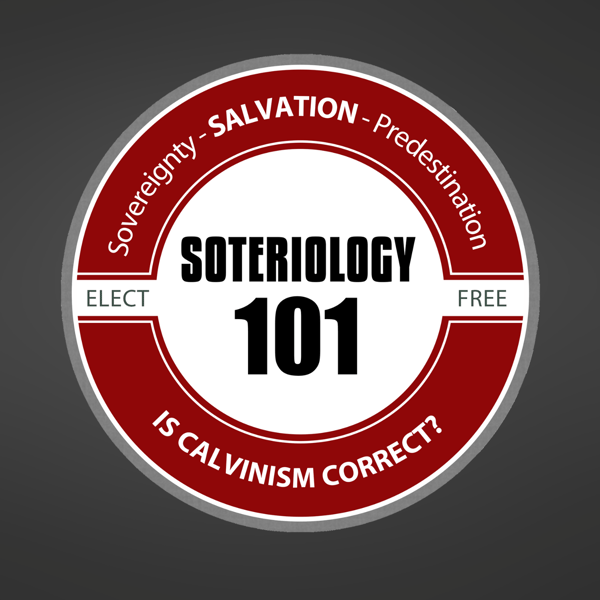Election according to Jesus
Soteriology 101 w/ Dr. Leighton Flowers
Leighton Flowers
4.8 • 826 Ratings
🗓️ 25 September 2019
⏱️ 7 minutes
🧾️ Download transcript
Summary
Dr. Leighton Flowers presents a short explanation of Jesus's parable of the Wedding Banquet in Matthew 22.
There are several divine choices made by God to bring about redemption.
1) The election of the nation that the king ruled over in the parable (representing Israel)
2) The election of the servants from that nation to deliver the wedding invitations (representing prophets/apostles).
3) The election of those who would receive the invitations (representing the message going first to the Jews and then to the Gentiles)
4) The election to permit those properly clothed in wedding garments to enter (representing those clothed in Christ’s righteousness by faith)
The moral of Christ’s parable was, “Many are called, but few are elect” (v. 14). In other words, many are “unconditionally” invited by “unconditionally” elected servants from an “unconditionally” elected nation.
- The nation was not chosen because it was more moral or more deserving (i.e. “unconditional”)
- The servants from that nation were not selected because they were more moral or more deserving. (i.e. “unconditional”)
- And the invitations were not sent to people because they were more moral or deserving. (i.e. “unconditional”)
- The invitation (WORD) was brought to the world through a nation (and individually selected servants from that nation). This is what Christ is referencing when he says, “many are called.”
What does Christ mean by “few are elect?” Clearly, this is in reference to those conditionally permitted entrance into the banquet based upon their being properly clothed in the right wedding garments. The King elects to permit those rightly clothed to come in while the rest are cast out. Likewise, God will only permit those clothed in the righteousness of Christ to enter heaven. The “few” who are “elect” were clearly conditionally chosen based upon their garments (the righteousness of Christ). This is the foundational understanding of “corporate election to salvation.” We are elect only insofar as we are connected with Christ (clothed in His righteousness).
This parable, like Romans 9, includes all of the King’s choices, not just the last one. In other words, the parable involves not only the King’s choice to grant or deny an individual’s entrance into the banquet, but also the King’s choices in fulfilling his purposes through his own nation and those individual servants selected to deliver the invitations. Likewise, Paul, in Romans 9, has all of these divine choices well in view.
For more please visit www.soteriology101.com
Transcript
Click on a timestamp to play from that location
| 0:00.0 | The parable of the wedding banquet taught by Jesus in Matthew chapter 22 gives us great insight into the doctrine of election. |
| 0:08.0 | Jesus began by comparing the kingdom of heaven to a wedding banquet being prepared by a king for his son. |
| 0:16.0 | The king gathered to himself servants or messengers to take the wedding invitation first to his own people, and when they refused, he sent the messengers to the highways and the byways, to the good and the battle-like, so that whosoever may come. |
| 0:31.6 | And so the wedding hall was filled with guests. |
| 0:34.6 | But the king noticed that one had snuck in without wearing the proper |
| 0:38.8 | wedding garments. He was bound hand and foot and cast out where there was weeping and gnashing |
| 0:44.6 | of teeth. And so Jesus concluded his parable by saying, many are called, but few are chosen. |
| 0:59.3 | Many commentators and pastors focused almost all the attention on this last choice, |
| 1:03.1 | the choice of those who are granted entrance into the banquet. |
| 1:09.0 | But in fact, there are four choices being represented here in this parable. |
| 1:16.6 | The first choice of the king is the nation which he rules, which represents the nation of Israel. Scriptures indicate that this nation is not chosen because they are a great worth or value, |
| 1:22.6 | but they were chosen unconditionally based upon God's purpose and love. |
| 1:28.0 | The second choice represented in the parable is the choice of the servants or the messengers |
| 1:33.9 | called to hand out the invitation first to his own people Israel and then to those on the |
| 1:39.9 | outside of the nation representing the Gentiles. |
| 1:43.8 | These messengers are clearly representative of the prophets and apostles, |
| 1:48.1 | chosen to take the good news to the nations. |
| 1:52.0 | These messengers were also chosen unconditionally, |
| 1:55.7 | not because of the morality or their worth. |
| 1:59.0 | The third choice in this parable is those who would receive the invitation. |
| 2:03.6 | The gospel is sent first to the Jew and then to the Gentile. |
| 2:07.6 | This choice is also not conditioned upon the morality of those receiving the invitation. |
... |
Please login to see the full transcript.
Disclaimer: The podcast and artwork embedded on this page are from Leighton Flowers, and are the property of its owner and not affiliated with or endorsed by Tapesearch.
Generated transcripts are the property of Leighton Flowers and are distributed freely under the Fair Use doctrine. Transcripts generated by Tapesearch are not guaranteed to be accurate.
Copyright © Tapesearch 2025.

